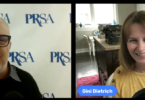It’s been a year since COVID-19 turned the world upside down. Things once considered normal now seem odd, even outdated. Sitting in a conference room with co-workers. Dining in a crowded restaurant. Grocery shopping maskless. Shaking hands.
We’re stressed out, Zoomed-out, burned out and drained by the whole pandemic. Teleworking has provided some obvious advantages — no commuting, no suiting up for work, more flexibility. But it’s also led to longer hours, increased angst, less camaraderie and more claustrophobia. (Is this room shrinking or is it my imagination?)
Technology has mitigated some of the impact of social distancing. We text, tweet, post, chat and even use our phones to talk (yes, talk!) all from the comfort of our homes. We “attend” virtual weddings, baby showers and happy hours. And of course, we sit in lots and lots of virtual meetings, trying to look interested, engaged and “put together” as we smile and nod, wondering if anyone will notice that we didn’t wash our hair, brush our teeth or change out of those sweatpants we’ve worn since President’s Day. (When was Presidents’ Day?)
For me, this pandemic has revealed something surprising — and it’s not about my hygiene; rather, I’ve discovered that the less we’re together, the more we communicate. It’s constant. And it’s exhausting, leaving us distracted and distressed, Zoom-fatigued, foggy-brained — and maybe a little cranky. We’re like pandemic pressure-cookers (or should I say a Pandemic InstaPots?) building up steam.
As traditional office settings move toward hybrid work environments, we’ll increase our time with technology and decrease our face-to-face interactions. We’ll send more messages and multitask our way through each day. We’ll improve efficiency, or so we think.
As Irish playwright, George Bernard Shaw once penned, “The single biggest problem in communication is the illusion that it has taken place.” We’re already communicating more than ever — but is anybody really paying attention? To be fair, technology is only partly to blame. Our behaviors and our habits contribute to the problem. Let’s embrace the future, of course, but let’s get back to the basics too — with these simple communication tips:
- Talk less. Listen more.
- People love to talk. But who’s listening? Now, more than ever, it’s important to pay attention
(Can you stop texting please?) to what people have to say. Next time you’re in a meeting, on a call or in a conversation, talk less, don’t interrupt and try actively listening. You might learn something new.
- People love to talk. But who’s listening? Now, more than ever, it’s important to pay attention
- Follow up, please.
- Respond to that email, message, phone call or text in a timely manner — especially if it’s time-sensitive. Don’t take so long to get back to a colleague on a shared project. It’s a simple courtesy. And speaking of courtesy…
- Mind your manners.
- Maybe it’s the stress of life these days, but common courtesy isn’t all that common. “Please,” “Thank you” and “How are you?” are in short supply. And yet, we need these pleasantries more than ever. A kind word or simple sign of appreciation takes little effort but can create positive results for you and your colleagues.
- Reduce virtual insanity.
- Another virtual meeting? Hide your speaker view. Others will still see you — but you won’t have to stare at yourself all day.
- Turn off your webcam intermittently to give that forced smile a rest.
- Look away now and then. Constant screen watching causes eyestrain.
- Get a good microphone so people can hear you clearly.
- Make sure the lighting is good. Light from above or in front of you — never behind you.
- Don’t sit too close — or too far from your camera and position it so you’re at eye level. Trust me, nobody wants to see up your nose.
- If possible, switch to conference calls on occasion. Your tired eyes will appreciate the break.
- Step away from that screen.
- Get up from your desk once an hour to stretch your legs, step outside or take a break. You will feel more engaged and energetic when you return.
- Phone a friend.
- Sometimes, there’s nothing better than making a phone call. Whether personal or professional, talking can eliminate endless emails, resolve issues more quickly, prevent misunderstandings and create opportunities for deeper, more satisfying engagement.
- Give it a rest.
- At the end of the day, give yourself permission to unwind. Turn off your electronics. Take a stroll, read a book, unplug. You’ll be more relaxed and better able to handle life’s stressors.
I’ve said enough for now. I’m following my own advice and heading out for a walk — without my phone. (Brave, I know.) But I’d love to hear from you, so feel free to share your thoughts or opinions. I promise I’ll respond — in a timely manner, of course — when I return.
Carole Bober Gentry is the managing director of communications for Maryland Lottery and Gaming. She is also a frequent speaker on communications issues in the workplace. Connect with Carole at cbgentrypr@gmail.com or visit her website at cbgentrycommunications.com.
[Photo credit: michael d. edwards]







As a current college student still adapting to Zoom classes and club meetings, this article really hit home for me. I have found myself growing more and more exhausted with Zoom and social media, where it really does feel as though I am saying so much to so many and yet I am still so alone and unheard compared to how traditional communication feels. Additionally, as a PR student and young professional, I feel this article contains great advice for PR professionals navigating the industry through a much more virtual lens. As interviews and meetings continue to be through video chat and phone calls, and clients continue to shift their focus to social media and the Internet rather than face-to-face communications, it is so important for all PR professionals to remind themselves how to communicate in the most effective, conscious and healthy way possible in our virtual world. -Rachel Breeding, writer/editor for Platform Magazine
Rachel:
Your comment raises an interesting point. As someone long since out of college, it would be easy for me to assume that your generation is perfectly fine with so much virtual communication. After all, you’ve grown up accustomed to social media and are far more tech-savvy than generations past. But in reality, it’s just as exhausting for you and your contemporaries. Online classes, video chats and virtual interviews are draining — maybe even more so than when done in person. It takes a different level of energy and attention to stay focused when you are constantly on-screen. To make matters worse, the feedback you receive during virtual exchanges is simply not the same as what you would receive in person. You sound like you have a handle on this current communications conundrum, so good for you! I hope you will continue to seek new and satisfying ways to communicate during these unusual times. Thanks for your thoughtful input. – Carole Gentry
The phrase “Zoomed-out” perfectly describes my exhaustion as a college student during the pandemic. As if I wasn’t the biggest procrastinator on the planet before COVID-19, imagine my motivation since I am able to sit in my pajamas all day. (Motivation is low.) I have to agree with the statement “the less we are together, the more we communicate.” But has everyone adapted or learned how to virtually communicate? This article provides the basic communication skills we all once learned, but performed in a public setting. As we adapt to the new “normal” of virtual communication, I believe this refresher of tips is useful. One extra tip I have seen to be helpful is to get ready for the day, regardless of if you leave the house. The saying “Dress for Success” truly has been beneficial in my productivity at home.
Although I agree with the tip “Talk less. Listen more.” I disagree in some situations. Students used to engage in conversation and ask questions in class when it was in person. Most Zooms result in professors lecturing and students listening. This could be due to students not paying attention or, like myself, having anxiety of unmuting themselves. Therefore, as I agree it is important to sit back and actively listen, discussion is helpful in some scenarios.
GEORGIA HAVENS
Western Kentucky University
I really enjoyed this blog post because I was able to relate. There was one line I really liked. “I’ve discovered that the less we’re together, the more we communicate. It’s constant. And it’s exhausting, leaving us distracted and distressed, Zoom-fatigued, foggy-brained — and maybe a little cranky”. I completely agree, we do communicate more the less we are together. We use Zoom for class, job interviews, group meetings, and more. Considering, we have been living with COVID for over a year now, the communicating aspect of our lives has changed even more. Most businesses utilize no contact as much as possible such as how we order food online and it is brought out to us while we wait in our cars. Some doctor’s offices do the same thing and have patients wait in their car until they call them. I can only imagine how online shopping has grown since COVID began, I know I shopped online more than I have in person. The tips offered for future communication are good to make sure the communicating we are doing is effective.
I agree with the overarching point this blog post made. I strongly agree with the claim that although virtual communication has made working more efficient, it has caused individuals that are working from home to feel extremely overwhelmed. As someone who works 7 days a week, the inability to leave work at work (because my job is done both virtually and in-person), is quite overwhelming, and I often get burnt out very easily. For people of older generations that are not used to this type of working environment, I can only imagine the impact this transition has had on their personal and professional lives.
I found all of the advice provided in the post to be very tangible and practical, which I value. I feel like other bloggers or influencers trying to provide advice on these types of topics aren’t necessarily always realistic, therefore aren’t helpful to their readers. I also liked that some of the advice wasn’t just how to deal with the new types of communication, but how to make your user experience better too; like the best ways to position the lighting when on zoom! All in all, I found this blog to be very helpful and an enjoyable read.
Kayla Peace
WESTERN KENTUCKY UNIVERSITY
As a current junior in college, I would have to say that this article hit the nail on the head with my thoughts from the past year. Burn out, specifically getting Zoomed-out, has affected everything in my daily life. As a PR student, my whole world revolves around communication.
Communication became stale rather quickly into the pandemic, which can be a bit of a roadblock for this field. Being a young PR student during this time also means that I have to work that much harder to stand out when presenting myself over Zoom. What living and learning through a pandemic has shown me most, however, is just how capable we are. We have shown that we are capable of making things work in the best way we can. While our communication has been different this past year, we can all do our part in making sure we can communicate as effectively as possible. The tips in this article are super helpful in doing so.
As a current college senior, this article touched a nerve with me. Since the start of the COVID-19 pandemic, every class that I have had has either included a mix of online learning or has totally replaced it with a complete online only experience overhaul. Frustrations have begun to ware. Learning and absorbing information has become more difficult and frustrating. While I agree with your point in the article about how people are spending more time trying to communicate with each other through the means of technology, it doesn’t seem to have the same impact. Often more times than not, student and teacher interaction has become weathered down and mute. Gone are the days of staying after class to speak with the instructor, now one must email and or call to ask any questions or even just try to engage with further mentorship and guidance. It makes the situation even more difficult when your major is under the umbrella of the communications discipline, public relations
Great article, Carole!
Due to the COVID-19 pandemic, many of us have spent more time on Zoom than we have probably anticipated. Although most of the classes on my college campus have returned to in-person, I still find myself attending one or two Zoom calls throughout the week. The communication tips featured in this article can be a great reminder for individuals that are working from home, completing virtual internships or commonly attending meetings through video chat. “Step away from that screen” is a tip from this article that I found to be really important. While I attend classes in-person, I complete most of my homework virtually. I spend a significant amount of time working on my laptop and constantly have to remind myself to take small breaks. Taking breaks allows me to recharge and as a result, I am able to produce better work. – Mallory Westry, writer/editor for Platform Magazine